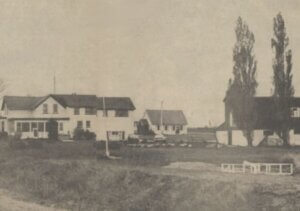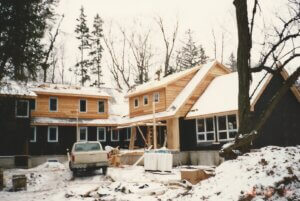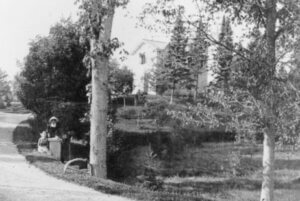Stonehenge Therapeutic Community started in the spring of 1971. Dr. John Dougan (1917 – 2009) was a psychiatrist who moved to Guelph in 1970 to be the Director of the Community Mental Health Clinic. In his work he recognized that many patients had addiction issues but there weren’t enough local programs to refer them to – so he started his own program! Dr. Dougan knew about the therapeutic community treatment model and thought it would work well for the addiction issues he was seeing in Guelph.

Dr. Dougan secured an unused farm near Campbellville, Ontario for a $1 lease and brought in the first ten residents. The residents grew and tended their own vegetables, raised chickens, and cared for “Gurtie” the goat. The rural setting allowed a focus on healthier living and forced residents to work together and solve problems proactively. They also received daily check-ins and counselling from Dr. Dougan and his staff from the clinic.
It was in these early days that the program got its name. In alignment with therapeutic community principles, it was actually named by one of the residents. The story goes that Dr. Dougan was at the farm talking with the residents. In the words of one of those first residents nicknamed ‘Stretch’ … “The program was so new it didn’t even have a name. The group of us – the very first group – decided to give it a name. One resident said it would be one of the eight wonders of the world if we ever got off drugs. So Dr. Dougan suggested that we name it one of the great wonders of the world. We went through all the wonders and finally agreed on one, so we named it Stonehenge. Dr. Dougan said I was the one who pointed to a pile of rocks on the farmland and suggested Stonehenge, but I don’t recall this.”
This first location was only available for the summer so Dr. Dougan found another rent-free loaner farm, this time near Elora, Ontario, then five years later another move to a farm in Belwood, Ontario, but the program always continued on in the same manner.

By the late 70’s Stonehenge started to become recognized for its unique program and its successes in treating addictions, and this led to winning funding contracts from correctional ministries, both provincial and federal. This meant that someone who was incarcerated (for non-violent offences) and with a known addiction issue could be recommended to participate in the Stonehenge program as a stipulation of their probation or parole. Soon after, the Ontario Ministry of Health provided funding for an additional ten residential beds, thus the program became available for free to anyone with an Ontario health card. These three Ministry contracts are still in place today.
In 1979, the farm Stonehenge occupied was being sold which forced yet another move, this time the only location that could be found was a farm west of Orangeville, Ontario.

After a prolonged search for a more permanent location, in 1981 Dr. Dougan and several investors found and purchased Alden Hall at our current ‘Wellington’ location in Guelph-Eramosa Township. With a new sense permanency, Dr. Dougan also incorporated the agency as a certified not-for-profit organization which led to the formation of the agency’s first Board of Directors in July 1981. Alden Hall has since been renamed ‘Dougan Hall’ in honour of Dr. Dougan.

In recognition of our effective treatment program, more beds were funded by the Ministry of Health over the 1980’s. This gave rise to the construction of a second building on our Wellington site in 1989. ‘Morrow Hall’ was a purpose-built dormitory supported by a $12,000 donation from the Guelph Lions Club. Morrow Hall is named after Irene Morrow, one of Stonehenge’s first official staff and a tireless supporter of Dr. Dougan, and to this day, Stonehenge’s only Honorary Board member.

The program remained co-ed at the Wellington site until the current ‘Westwood’ site was purchased in 2000. Like the Wellington site, this site also had two buildings; an Administration building which serves as Stonehenge’s head office, and a large heritage home historically referred to as ‘Ellenburn’. In 2002, renovations to convert the house into a treatment facility completed and Stonehenge’s residential program officially became gender-specific, each with its own site. This gorgeous limestone building built circa 1860 has since been renamed ‘Century Home’.

After operating a residential treatment program for almost 40 years, new funding from the Ministry of Health started to focus on community-based programs. In 2010 Stonehenge received funding for a supportive housing program, and over the next ten years received additional funding for a breadth of community services. These new services include outreach, support coordination, withdrawal support, court support, overdose response, addiction clinics, rural services, as well as expanded housing. Now in operation for over 50 years, Stonehenge offers a full spectrum of addiction programs and services spanning from our long-standing residential treatment program to our ten different community-based services.

